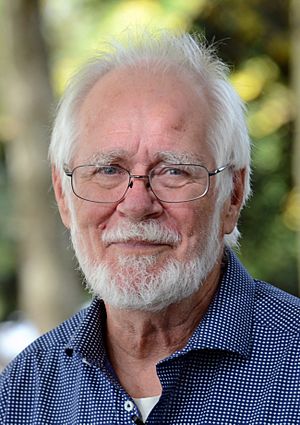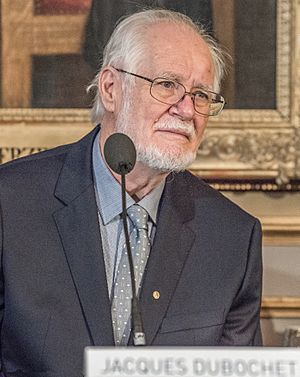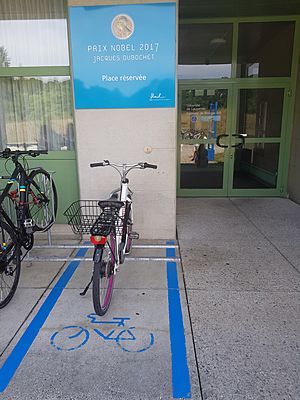Jacques Dubochet facts for kids
Quick facts for kids
Jacques Dubochet
|
|
|---|---|

Dubochet in 2017
|
|
| Born | 8 June 1942 |
| Citizenship | Switzerland |
| Education | École polytechnique fédérale de Lausanne (BS) University of Geneva (MS) University of Geneva (PhD) University of Basel (PhD) |
| Known for | Cryo-electron microscopy |
| Awards | Nobel Prize in Chemistry (2017) |
| Scientific career | |
| Fields | Structural biology Cryo-electron microscopy |
| Institutions | European Molecular Biology Laboratory (1978–1987) University of Lausanne (since 1987) |
| Thesis | Contribution to the use of dark-field electron microscopy in biology (1974) |
| Doctoral advisor | Eduard Kellenberger |
Jacques Dubochet (born on June 8, 1942) is a retired Swiss biophysicist. A biophysicist studies how living things work using physics. He used to be a researcher at the European Molecular Biology Laboratory in Heidelberg, Germany. He is also an honorary professor at the University of Lausanne in Switzerland.
In 2017, he won the famous Nobel Prize in Chemistry. He shared this award with Joachim Frank and Richard Henderson. They won for creating a special method called cryo-electron microscopy. This method helps scientists see tiny parts of living things in amazing detail. In 2018, he also received the Royal Photographic Society Progress Medal for his work in imaging.
Contents
Jacques Dubochet's Amazing Career
Early Studies and Research
Jacques Dubochet began studying physics in 1962. He attended the École polytechnique de l'Université de Lausanne. In 1967, he earned his degree in physical engineering. He then studied molecular biology at the University of Geneva in 1969. After that, he started researching how to use electron microscopy to study DNA.
In 1973, he finished his important research. He earned his PhD in biophysics from both the University of Geneva and the University of Basel.
Developing New Technologies
From 1978 to 1987, Dubochet led a research group. This was at the European Molecular Biology Laboratory in Heidelberg. Then, from 1987 to 2007, he became a professor at the University of Lausanne. He retired in 2007 and became an honorary professor there.
During his career, Dubochet created new ways to use cryo-electron microscopy. This includes cryo-electron tomography and studying vitreous sections. These methods let scientists take clear pictures of tiny biological structures. This includes things like protein complexes and virus particles.
At Lausanne, he also helped scientists think more about social issues. In 2014, he received the EMBL's Lennart Philipson Award.
The Nobel Prize Discovery
Professor Gareth Griffiths, a colleague of Dubochet, explained his big discovery in 2015. Jacques found a way to freeze very thin layers of water so quickly. This fast freezing stopped ice crystals from forming. Ice crystals can damage the tiny samples scientists want to look at.
Over time, this special freezing method became super important for life science research. It helped scientists see things they couldn't before. It was clear that this amazing technique was worthy of a Nobel Prize.
A Special Parking Spot
When his university asked how they could celebrate his Nobel Prize, Jacques had a unique request. He asked for a parking spot for his bicycle! He had cycled to his lab almost every day for 30 years. The university happily gave him his special bicycle parking spot.
Dubochet Center for Imaging
In late 2021, a new research center was opened in his honor. It is called the Dubochet Center for Imaging (DCI). It was started by the Swiss Federal Institute of Technology in Lausanne, the University of Lausanne, and the University of Geneva. Just a few weeks after it opened, the DCI helped scientists understand the Omicron variant of the COVID-19 virus.
About Jacques Dubochet
Jacques Dubochet is married and has two children. He has dyslexia, which means he sometimes has difficulty with reading.
In the 1970s, he and his future wife went to a protest. They were protesting against the building of a nuclear power plant. This shows he cares about important issues.
Dubochet is also involved in his community. He is a member of the Social Democratic Party of Switzerland. He also serves on the local parliament in Morges. He is part of the climate movement and a member of "Grandparents for Future." He often talks about how important it is to protect our planet.
See also
 In Spanish: Jacques Dubochet para niños
In Spanish: Jacques Dubochet para niños



